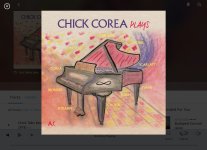Coltrane might just be the most influential of all jazz musicians ever.
He was instrumental in stretching the genre into what is now called Modal jazz, Free jazz and Avant-garde jazz.
John Coltrane - Wikipedia
For the purposes of this thread, arranging your albums per release date and jazz type
Blue Train (January 1958, Hard bop)
Soultrane (October 1958, Hard bop)
Settin the Pace (December 1961, Hard bop)
A Love Supreme (January 1965, Free jazz, Modal jazz, Avant-garde jazz, Post bop)
The Avante-Garde (1966, Free jazz, Avant-garde jazz)
Information on each album is available in the links but the standout album is "A Love Supreme".
Once again these are all fantastic albums and highly sought after in the jazz world.
Again for context do consider watching "Chasing Trane: The John Coltrane Documentary" on Netflix
https://www.netflix.com/watch/80147403?source=35
Regards
.

